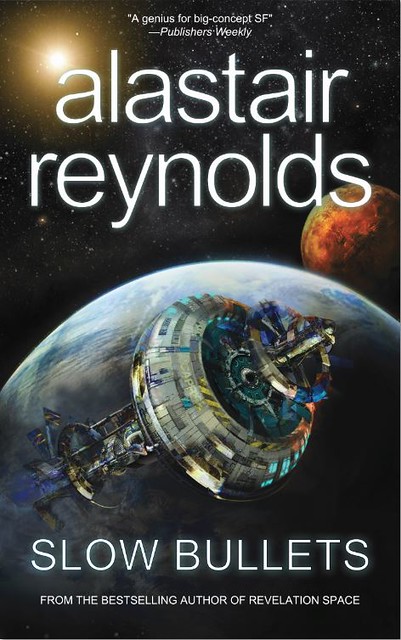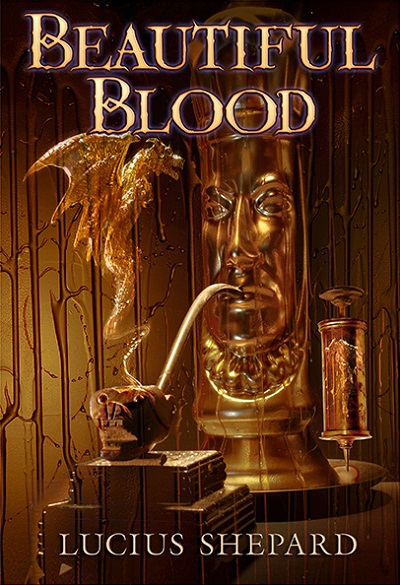 |
| WSFA Press limited edition |
The weekend of October 9-11 marked the annual Capclave convention in Washington, DC, sponsored by the Washington Science Fiction Association (WSFA). Each year, in support of Capclave's Author Guest of Honor, WSFA Press typically publishes a limited edition hardcover of the author's work. This year's Author GOH was none other than Alastair Reynolds -- and WSFA Press published a signed and numbered hardcover edition of the author's novella Slow Bullets, limited to 1,000 copies.
 |
| Tachyon Pubs trade paperback |
Slow Bullets was originally published by Tachyon Publications as an original trade paperback, and as you may recall from an earlier blog post on February 9, 2015, I had a wee bit of a hand in the acquisition and editing of that book.
was originally published by Tachyon Publications as an original trade paperback, and as you may recall from an earlier blog post on February 9, 2015, I had a wee bit of a hand in the acquisition and editing of that book.
You can purchase the limited edition of Slow Bullets direct from the WSFA Press Bookstore for the price of $40.00; the original trade paperback of Slow Bullets (List price: $14.95) -- now in its second printing -- can be had from all major booksellers, physical or online.
I would like to take this opportunity to thank the author, Alastair Reynolds, for graciously sending me a copy of the Slow Bullets limited edition while he was attending Capclave.
Here are a few excerpts from the lengthy Slow Bullets review by Tom Atherton on Strange Horizons:
...part of what makes Reynolds's new novel Slow Bullets so successful is this sense of escalation. What begins as run-of-the-mill space opera soon develops into a complex social thought experiment; an examination of the tyrannies of ambiguous language and the societal implications of textual preservation. It's impressive that Reynolds manages all of this big-picture stuff within the scope of an uncharacteristically short novel (just shy of two hundred pages), and does so while simultaneously retaining a sense of intimacy through a well-realised narrator whose own struggles with memory act as a microcosm of the book's wider sociological concerns. The novel is also interested in atavism (both technological and social), and so it's fitting that Reynolds has appropriated the imagery and themes of an older literary tradition, gothic horror, to tell this story; only in place of a dilapidated monastery inhabited by reclusive monks, Slow Bullets gives us soldiers-turned-scribes entombed inside a vast and decaying spaceship. Architecture is important here, as is the intersection of technology with biology. There really is a lot going on; a fact belied by the book's meagre page count. With so much to unpick, then, it’s probably best that we start at the very beginning and work forward from there.
...
It's all very pacy, with much of the actual process behind these fledgling democracies glossed over in a matter of sentences. It's a revelation-on-every-page sort of book. Fans of Alastair Reynolds looking for his characteristic descriptive depth and attention to technological detail might find themselves disappointed, but for what it's worth I enjoyed this change of tempo, which, if anything, demonstrates Reynolds's versatility as a stylist.
In fact, Slow Bullets has a lot of very nice stylistic touches. It's peppered with expressive little descriptions, such as this one about a book whose pages "detached too easily, the way wings come off an insect" (p. 13). I was also struck by the way that biological imagery is used to describe technology: slow bullets move by "contracting and extending like a mechanical maggot" (p. 16), hibernation capsules enclose "like an egg" (p. 21), and an automated surgeon-machine reminds Scur of "the hinged mouthparts of a flytrap" (p. 74). All of which sinister language reflects the relationship the crew have with the failing tech that surrounds them: dependency mixed with danger. The only complaint I have about style is that there are a few too many infodumps, which have the potential to interrupt the otherwise swift flow of Reynolds's prose.
...
The overarching tone of Slow Bullets, then, is one of tragic irony. The Caprice-ians' assertion that they are making indelible, accurate records ("we can’t tolerate mistakes" [p. 112]) is contradicted by how the novel itself treats texts. One character even comments on the inability of language to explain their situation; "She’s trying to describe something language isn't made to describe" (p. 118). All of the texts the survivors produce are, ultimately, unstable. Not only, as we've seen, are they up for interpretation and forgery, but they're also physically transient: the walls can be polished blank, the slow bullets over-written; the survivors' text-scarred bodies will die. Perhaps, deep down, they all know this. Maybe creating texts is just another way in which the survivors are performing society.
This would all be so much bathos, of course, if the novel presented itself matter-of-factly as an unequivocal, representational record. Reynolds's masterstroke, however, is to reflect this thematic concern for unstable texts by filtering the story through an unreliable narrator, making Slow Bullets itself something ambiguous and difficult to pin down. Scur, narrating from some future point, begins her story by telling us about her favourite poem, which is "about death and remembrance" (p. 10). This microcosmically echoes the themes of the novel, certainly, but remembrance, it turns out, isn't as straightforward a thing as Scur would have us believe. Her narration is frequently inconsistent and contradictory. She hubristically announces that she can "be perfectly sure of [her]self" (p. 100), yet phrases of an "I don’t remember" variety become refrain-like throughout the novel. "I should remember, but I do not" (p. 189). At one point her very identity is questioned: "So Scur is what she calls herself now?" (p. 141). We're also never given any explanation as to why, despite her protestations of innocence, she's counted among the war criminals onboard the ship. This is Scur's memory, but memories are biased, unreliable and prone to fanciful invention. With Scur as our only point of entry into this world, we can’t trust anything we read.



